- Home
- Joseph Bruchac
Killer of Enemies Page 9
Killer of Enemies Read online
Page 9
What are the most precious things in the world? Not gold or silver or diamonds or the possessions that people killed each other for in the old pre-C days. I mean those things that you need to stay alive.
The first is shelter. Without shelter you freeze in the winter or die of heat stroke in the summer. Without shelter from predatory beasts, you end up as an entrée. And shelter is what Haven offered those who chose to seek refuge here. That is why so many people came here of their own accord. Far fewer were brought here at gunpoint like my family and me.
The second precious thing is water. You can live for days with no food. But not without water. And there is also water at Haven. It flows up on its own from an artesian well. So there is no need for those irrigation pumps that used to bring water up from deep below the surface—so deep that hand pumps would not work. In the pre-C days that artesian well was a nuisance. Its flow was pumped away because the prison had a bigger water source from a community water treatment plant four miles away. That plant, of course, is a dry ruin now.
So that artesian well is far from a nuisance now. It provides enough water for every soul in here—if they behave. Misbehave and the daily water ration is decreased or cut off entirely. A single day without water is enough to bring most ordinaries back in line.
Of course our rulers are exempt from any rationing. The Ones use some of that water to fill a swimming pool they have installed in their secure enclave in the heart of Haven, while we only get enough water for the barest essentials. If it rains enough to fill the tanks on top of the shower shed, the communal showers can sometimes be used. But you only get four seconds of flow.
As far as the water from the well goes, each day we line up at the water house with our containers and ration cards. God help you if you lose your ration card.
That’s another reason why people lock or barricade the doors of their cells. Water theft happens often. You might come back home to find your water jug drained.
Thinking of how important water is here makes me think of how we irrigate the gardens, which are a major source of the third precious thing needed to live. Food. Which makes me think of Hussein. It’s about time for his morning ritual.
But I skipped one other source of survival. It’s one we forget about until the cold or the dark close in on us. I climb up on my cot and look out through the bars. There, on top of the part of the wall I can see from here, is that old friend of human life.
Fire.
The fires on the fortress walls are still burning. I’ve gotten so used to their harsh smell—nothing is more pervasive than the stench of burning rubber tires—I can sleep through the night without thinking about what I’m smelling. A better option than dying with sweet-scented air. Without those hundred bonfires, creatures of the night might come close to the walls without being seen. Even worse, they might come over those walls.
As I peer up at the wall fifty yards away, I catch a glimpse of one of the wall watchers. It’s a blocky man whose name I don’t know. Like all the watchers, he’s armed with a shotgun, slung by a strap over his shoulder. He squints his eyes, partly from the smoke and partly from four hours of staring out into the dark, looking for any movement. In his other hand is a torch. All the wall watchers carry one. See anything moving outside near the wall, throw the torch down in that direction and then shoot at whatever it discloses.
Then, if it’s more than an unlucky coyote or a stray shadow, follow it up with one or two of the Molotov cocktails lined up in racks along the inner edge of the wall. It’s amazing how effective a bottle half filled with gas with a rag stuck in it can be.
The wall watcher moves out of sight. I’m glad of that.
This part of the prison wall faces east. He won’t block my view of the new light of the day. I always say hello to the sun as it comes up. I whisper a silent prayer to the Life Giver. I ask for health and help for my family. Then I listen for what always come next. Through some strange acoustic property, maybe the shape of the wall and the design of the cell blocs, I can hear Hussein’s morning song from his cell a hundred yards away in the Men’s Wing that also faces east.
He gets up at the same time I do every day. Garden work starts early. He goes to the window of his cell and sings—without his guitar, just his lilting voice—his own greeting to the new day. I don’t understand exactly what he’s singing. Not the words at least. They’re in Arabic.
But that song has a lilt to it that reminds me of an Apache prayer being chanted. It sounds reverent. It makes my heart feel fuller hearing it. I am certain it is praising and pleasing the Creator.
I wait. But not long. Sweet as the notes of a cactus wren, Hussein’s soft chant begins.
My concentration on his song is interrupted. Boots are coming down the corridor, scuffing the concrete, approaching the door of my cell. I hop down off my cot, straighten up and wait. They’re coming for me. Could it be another summons, already, for a mission outside the walls? I don’t know. There are reports of a monster not far from here that I’ve been expecting to be sent to dispatch for some time. Perhaps they’re finally getting around to it.
But I can safely assume who it is this time. He’s the only one who ever summons me this early in the morning. All of the Ones are evil and unpredictable. But none of them creep me out the way this overlord does. The one whose strange chamber I’ll soon be entering.
The Dreamer.
CHAPTER SEVENTEEN
The Dreamer
The Dreamer’s chamber—chamber, not room, is the only word for it—is as weird and otherworldly as he is. The room is hung along two of its walls with heavy red curtains, blood red. They are draped in such a way that they seem to be moving. That’s because of the light reflecting from the third wall, the one to my right.
That wall is covered with mirrors of all shapes and sizes. Some of them seem to have come from a sideshow funhouse from one of those carnivals that used to exist B.C. They distort the shapes they reflect in bizarre ways. They catch and twist the light cast by the candles and oil lanterns hung in front of them. Look too long at those mirrors and you start to lose your balance. This chamber may be the smallest of the rooms occupied by our overlords, but the lights, the mirrors and those rippling vermilion curtains make it seem as if it has no boundaries in any direction.
It’s as if I just stepped into the heart of a monster. Although that simile is probably not that good, seeing as how the monster himself is inside this shifting, dizzying crimson cubiculum. There he is, lounging on a divan that is as spotlessly white as everything else around him is scarlet, including the thick rugs and the ceiling itself.
The divan is large, but it barely holds the Dreamer’s languid, sprawled form, wrapped in a red silk dressing gown decorated with Chinese dragons. He’s the tallest of the Ones, perfectly proportioned like all of them, but over seven feet tall. His legs, feet encased in tight, ruby-colored slippers, hang off the end of the divan and one of his lanky arms is extended so that his hand, palm up, rests on the floor. His other arm is held up in a theatrical fashion, the back of his hand covering his eyes. He looks like a fop, a spoiled silly prince of the sort you used to see in very old films. That impression of harmless indolence is aided by the mask he wears that covers his face from his hairline down to his chin, leaving only one eye and his lips exposed. His mask, which resembles the bemused face of an ancient Chinese emperor, is covered with small garnets and rubies that twinkle in the bizarre, shifting light. It’s so weird it’s almost funny. But no one brought here ever laughs.
If what I have heard is true, the white slipcover of his divan has to be regularly changed. Otherwise, it would match the rest of his chamber. And it is not paint, but his sanguinary practices that stains them.
He acts as if he has not seen me. But as the guards step back, I can sense that he’s well aware of me and about to act.
Stay calm, girl. Here it comes.
As sudden as a snake striking, the Dreamer uncoils, covering the thirty or so feet between us in a sing
le, feral leap. He lands, looming over me with his hands held above my head like claws.
I don’t move. I stay at ease, my eyes down.
He leans his head down close to my face.
“My little killer,” he hisses. “One dreamt of you last night.”
Not something you’d want to hear from his lips. Being the girl of his dreams may mean that once you are brought to his chamber of horrors (which is rumored to be even worse behind those curtains) you will never be seen again. Whenever new people are brought to Haven or manage to reach here to beg for admittance, the Ones are always there, standing on the wall walkway above the main gate to look them over. Ostensibly they are here to assess them to decide for what duties they may be best suited. Usually it is the Dreamer who speaks.
“That one, to the kitchens.”
“That strong looking one—wood cutter.”
“Machine shop.”
“Gardens.”
But every now and then, one of those sanctuary seekers—always a handsome young man or a lovely young woman—catches the fancy of Diablita Loca or the Jester. With a gesture of the hand, that unfortunate chosen one is led off . . . and is never mentioned again.
All we have are rumors. None of us peons are given access to the truth. But whispers do slip out from some of the more careless or squeamish of the guards, about what was done to that new fish who came swimming into our pond and disappeared without a ripple.
Now and then, though, it is the Dreamer who makes a personal choice.
I picture the Dreamer standing there on the wall. I imagine him raising one arched eyebrow as he takes in the unfortunate person looking fearfully up at the four gods standing in judgment. A chill goes down my back as I imagine him pointing down languidly and drawling to the other three, “One dreamt of that one.”
Fast as the Dreamer is, I think that I may be faster. Even as nearly naked as I am, there are a dozen or more ways I could kill him before he could make a single move to defend himself. I allow myself the luxury of picturing him falling backward, blood oozing out of the corner of his perfect mouth after I have crushed his windpipe with a ridge-hand blow. But that is as far as I can go. Not if my family and I are going to survive.
One day, one day.
But not today.
The Dreamer spins on his heel, cartwheels, and drops back onto his couch.
“One dreamt,” he whispers. “Do you understand dreaming, my little killer?”
I shake my head, as if giving him a negative answer. But I do understand dreams . . . and wonder if he does. Does he truly understand the power of dreams? He says that sees things in his dreams. But is what he sees just something he hungers for?
“One saw something one just must have,” the Dreamer says in his soft voice. He waves a languid hand toward the two guards standing behind me. “Now, one might send one of them to get the object of my desire. Karl there and Samson and, oh, twenty or so others. You’d be delighted to do that for One, wouldn’t you, my boys?”
I’m not sure which of the two my mind picks up. But as soon as he speaks their names a panicky thought from one of them knifes through my head.
Christ, no!
“But that is too risky,” the Dreamer continues, his voice so low now that I doubt the two increasingly nervous men behind me can hear it. “One must maintain the balance of power to keep One’s friends by One’s side. Mustn’t One?”
He is talking about our other three petty rulers. I’m one of the few who know just how much the four of them hate each other, and that is only because of my special abilities. If they could, the Ones would gladly cut each other’s throats.
“No,” the Dreamer says, his voice loud enough for the relieved men behind me to hear. “One must disappoint you lads and not afford you the chance to undertake this mission for One.”
He snaps his fingers.
A tall, bone-thin woman slides out from behind the curtains. Her face is pale as paper and just as expressionless. She’s attired, of course, in the Dreamer’s favorite hue from her high heels and sheath dress on up to the hyacinth hairpins that hold the thick, high-piled honey-blonde curls on top of her head. She’s holding a book. As she approaches her master and presents it to him with upraised arms, bowing in a deep curtsey as she does so, I can see that it is a collection of color photographs from an art museum.
“Thank you, Lorelei,” the Dreamer says.
Lorelei. The Dreamer’s helper. I’ve not seen her before, but I have heard her name mentioned. It’s said that those who do get to see her usually never get to see anything else.
For a moment, the Dreamer studies the large book that he holds easily in one large hand. Then he snaps his fingers again.
“Now go.”
Lorelei nods and bows. Her perfect blue eyes take me in as she lifts her head. She licks her lips like a cat anticipating a delightful dinner. A smile—not at me, about me. A graceful turn. Four dance-like steps back and Lorelei slips smoothly through the curtain. Smoothly enough to prevent my getting a brief glimpse of what is back there. But my imagination fills in what I don’t see. Another shiver runs down my back.
“Observe.”
The Dreamer has just spun the book in his hand and holds it out for me to peruse an open page. He taps the photo in its center. “Can you remember this?”
“Yes,” I say. It’s the only word I have spoken thus far.
The Dreamer studies me. I focus on the photo in the book. It is of a small, ornate mirror, its rococo frame characteristic of a style of artistic expression prevalent during another time of self-centered monarchs. Excessively ornate, but interesting. I’ve always liked looking at art and learning about it, even though there was no way in hell our family would ever own any and I seldom got the chance to see any of it outside a viddy screen in the pre-C days.
The Dreamer slides his long, perfect finger to the text beneath the photo. “Can you read, my little one? This was owned by the Sun King. Louis the Fourteenth of France. Ever heard of him, my little killer? No? Ever heard of France?”
The self-satisfied sarcasm in his voice is so thick you could cut it with a knife. Just as I could cut his throat by breaking one of those mirrors and using a sharp shard of glass to part his breath from his lungs with one quick slice. It would be so simple to do. I could do it all in less time than it would take to count to four.
But four is the magic number. There are four of them. Kill one and it will just make the other three stronger. And my family and me deader. There’s no other course now than to follow orders. While quietly doing whatever I can to plan for our someday escape.
So all I do is stare up at him with what I hope is a confused look and shake my head. I do not open my mouth to ask him how much he really knows about that mirror he lusts for, about the rocaille ornamentation of eighteenth-century France with its fanciful and frivolous use of curved spatial forms.
The Dreamer shakes his head, disgusted by my stupidity.
Is she truly this dense? One might as well be talking to a slug. But if anyone can accomplish this task, she can.
“Never mind. All that matters is that in my dream I saw it. I know where it is. My dream told me.”
Dream, my ass. He may fool others into thinking he has prophetic ESP, but I noticed that it said very clearly on the page with the photo of the mirror exactly where it was located.
The Dreamer nods. “It waits there. Unbroken, perfect. It waits for One to claim it. Which you shall do for me, yes?”
I nod. Even though I am a little confused by his request.
Bringing back an art object for one of our overlord’s collections is not exactly the sort of job I usually do. Which means there has to be more to it than simple retrieval.
CHAPTER EIGHTEEN
The Bloodless
The gates of Haven are now an hour’s ride behind me. And I have a lot to think about. As I pedal along, the gentle whir of the rubber tires against the road, the slight clatter as I shift gears when the road rises, a
re a comforting sound. They’re almost like a song. The wind is in my face, the scent of sage is in the air, and I’m out from behind the walls. And I can pedal this bike down the highway without fear of being squashed by a boulder dropped by a Monster Bird. I suppose I should be feeling good on some level. Aside from the usual knot somewhere in my stomach that I always get when I am sent out on one of these missions to kill—or be killed. But there’s something else disquieting this time. Two somethings.
I stop at the top of the last bend in the road where I can look back and see the old prison. I lift up the motorcycle goggles I’ve been wearing to keep the road dust out of my eyes. Maybe I don’t need them all that much. But I really love them. My dad gave them to me. He’d liberated them from a museum exhibit in a little ghost town only a week before we were taken. His last gift to me.
I squint against the light, put a level palm across my forehead to shade my vision. The gates are still closed. I’m not being followed by anyone. Not yet, at least. But that feeling that I may be followed is something Numero Uno. Partially a result of my Power. Right now it is tugging at the back of my brain and telling me to keep looking back. And partially because I noticed the little group of men who were casually gathered together at the far side of the exercise yard past the armory. None of them were wearing armbands. And that was strange. All but one of them were carefully not watching me as I left. They were also making a point of not looking toward the armory. Which made me suspect that was where they were heading as soon as the gates closed behind me. To get geared up and follow me?
But not yet. The gates stay closed. I sigh, lower my goggles, shift my backpack—a little heavier than usual because of the weighty items at the bottom of it—and then apply my feet once more to the pedals.
And I begin to think about reason Numero Dos for my disquiet. Snakes. I am less than fond of snakes. That’s a weakness of mine, I know.
Dad talked to me about snakes. I remember one day when we were out walking through the desert. It was after one of those rare soaking rains that bring everything into bloom. The ocotillos were vibrant with blossoms as red as flames and the green of the cactuses was so bright that they seemed to throb in the sunlight. Little buds started to open into delicate flowers on their spiny surfaces. Even the stones were brighter, glowing like the diamonds and emeralds and rubies I’d seen in a cartoon pirate’s treasure chest. Only it seemed to me that the stones of our desert were much more precious than those in any old wooden box. I was only six years old and holding my father’s hand as we walked and everything was perfect.

 Peacemaker
Peacemaker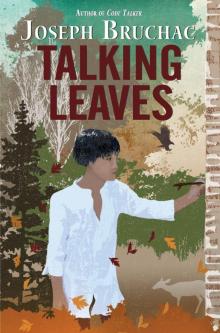 Talking Leaves
Talking Leaves Found
Found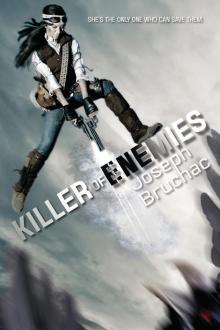 Killer of Enemies
Killer of Enemies Wabi
Wabi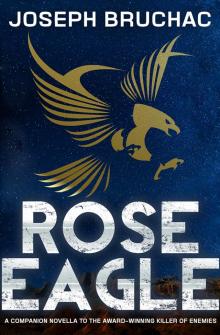 Rose Eagle
Rose Eagle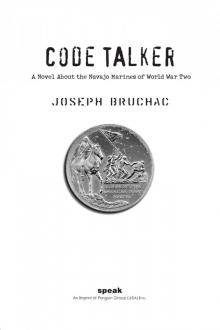 Code Talker
Code Talker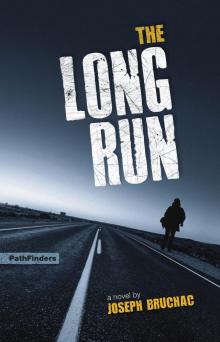 The Long Run
The Long Run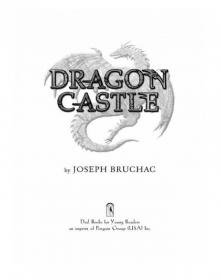 Dragon Castle
Dragon Castle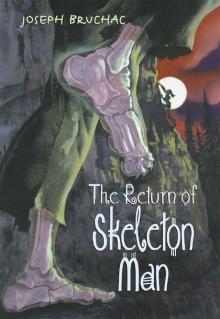 The Return of Skeleton Man
The Return of Skeleton Man Pocahontas
Pocahontas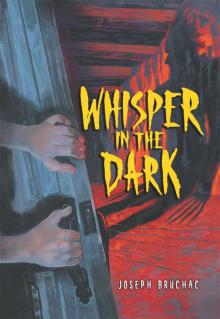 Whisper in the Dark
Whisper in the Dark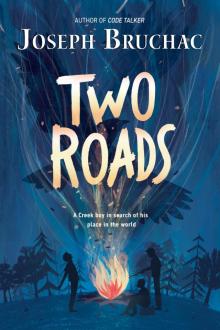 Two Roads
Two Roads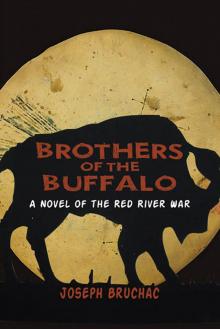 Brothers of the Buffalo
Brothers of the Buffalo The Warriors
The Warriors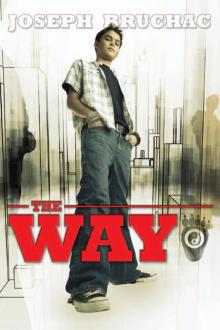 The Way
The Way Sacajawea
Sacajawea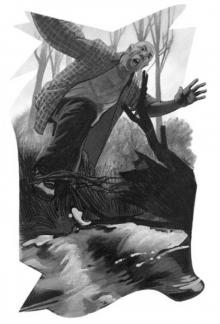 Night Wings
Night Wings March Toward the Thunder
March Toward the Thunder Bearwalker
Bearwalker Skeleton Man
Skeleton Man The Trail of Tears
The Trail of Tears On This Long Journey
On This Long Journey Flying with the Eagle, Racing the Great Bear
Flying with the Eagle, Racing the Great Bear